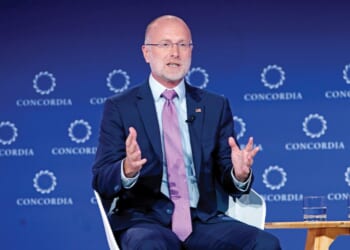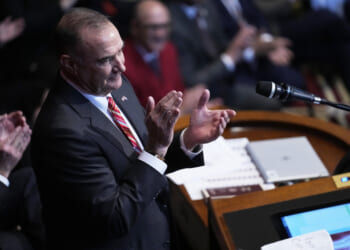Transportation Secretary Sean Duffy vowed Thursday to emphasize space exploration at NASA instead of “all the other priorities” that were favored by the Biden administration.
Duffy, who oversees NASA as its interim administrator, said during a Fox News interview that investing in space exploration, including inhabiting the moon as a means of going to Mars, is essential to national security.
While NASA strayed from its core mission during the Biden years, the agency is returning to its original focus by seeking to put a nuclear reactor on the moon, spurring private-public sector space partnerships, and reducing federal red tape restricting innovation in the commercial rocket industry, including through President Donald Trump’s Wednesday executive order on the matter, Duffy said.
“All the climate science and all of the other priorities that the last administration had at NASA, we’re going to move aside, and all of the science that we do is going to be directed towards exploration, which is the mission of NASA,” Duffy said during a Mornings with Maria Bartiromo interview on Fox Business. “That’s why we have NASA — to explore, not to do all of these other sciences.”
“The [Biden administration] had this whole smorgasbord of priorities,” Duffy added, but under the Trump administration, “we explore space, and so we’re going to go to the moon, we’re going to go to Mars.”
Duffy said he wants to streamline regulatory infrastructure overseeing space exploration to make it easier for companies to develop innovative technologies.
“We only have 60% of the [space]launches right now in America,” he said. “And the reason we don’t have more launches is because of the rules, regulations, and red tape that come around the launch, right? We want to do things safely. And so with me at both DOT, which has [the Federal Aviation Administration] and NASA, we have to work as one government. And what was happening was you have regulation from FAA and regulation from NASA and regulation from commerce, and we want to speak with one government, streamline that red tape, reduce costs, and allow all of the launches to happen in this country.”
Duffy said it took the United States 35 years to get to 1,000 commercial space missions, a milestone reached this week. He said he believes Trump’s executive order this week, reducing regulations in the industry, could propel the next 1,000 launches from the private sector in under five years. Further investments in the space world, particularly in establishing a base on the moon, are critical for national security as other major geopolitical players, including Russia and China, race to be the first to build a lunar nuclear reactor in order to expand energy capacity.
“We want to put a nuclear reactor on the moon,” Duffy said, “Because at the south pole of the moon — I don’t think a lot of people understand this, there’s ice. Ice means water, which means we can inhabit the southern pole of the moon. You need an energy source. So some of it can be from solar, but the most reliable energy source is going to come from nuclear. And so we have fast-tracked this approach.”
TRUMP COMMISSIONS NEW COAST GUARD ICEBREAKER WITH AIMS OF BOOSTING ARCTIC SECURITY
Duffy hopes to have the U.S. nuclear reactor on the moon by the end of the decade.
“You talk about how important space is,” he said. “It is critical. And again, we want to drive peace. We don’t know where other countries are going to be out in space; they could see a strategic military component to space, which we want to deter.”















